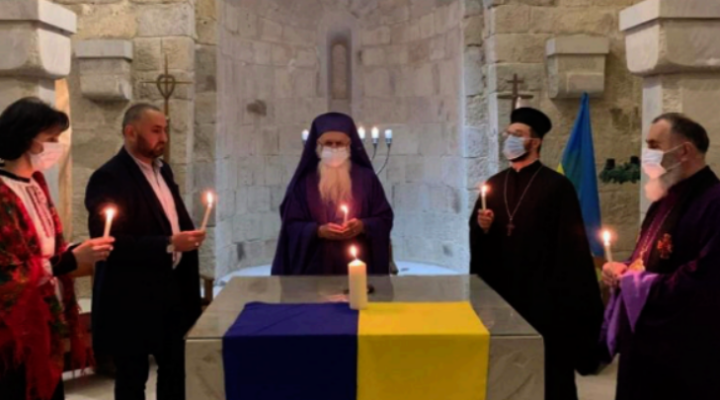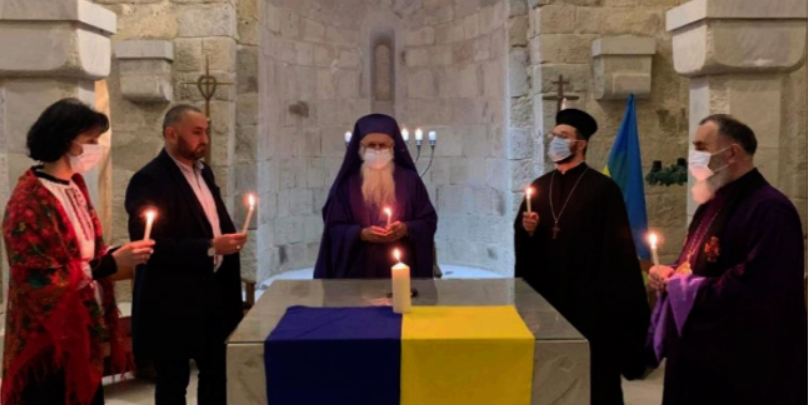Bishop Malkhaz Songulashvili is all too familiar with the criticisms of interfaith dialogue, especially as his Peace Cathedral in Tbilisi, Republic of Georgia, moves toward completion of a facility designed to host Christian, Jewish and Muslim worship and promote stronger relationships between the three Abrahamic faiths.
But Songulashvili said neither his nor the other congregations involved in the Peace Project are seeking to water down or merge their spiritual traditions, as some critics claim.
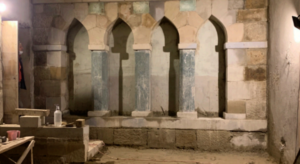
The mosque inside the Peace Project under construction.
“This project will respect the liturgical integrity of each community, each in their own space, but there will be a fellowship hall where Muslims, Christians and Jews can come together for meals and food. We do not encourage or approve of some sort of religious syncretism.”
Founded originally as First Baptist Church in Tbilisi, the Peace Cathedral is the oldest Baptist church in the Republic of Georgia and a partner of the U.S.-based Alliance of Baptists. It is known as a champion of interfaith cooperation, religious freedom and social justice throughout the Caucasus region of Eastern Europe and Western Asia. Its embrace of gender equality and LGBTQ rights, and its practice of ordaining women, often have resulted in harassment from both political and religious authorities, including other Baptists.
That experience helped inspire the Peace Project, which will combine in one facility separate worship spaces for Christians, Jews and Muslims who also will share combined accommodations for fellowship, study and interfaith relationship building. The anticipated completion date is Pentecost 2023, depending on the availability and cost of construction materials.
A summary provided by the cathedral said the initiative will include adult and children’s libraries and an interfaith dialogue center “designed to create a spiritual home for Abrahamic faiths, including both Sunni and Shi’a Muslim communities. The Peace Project is envisioned to be a profound example of what the world can be, and should be, in cooperation and respectful unity.”
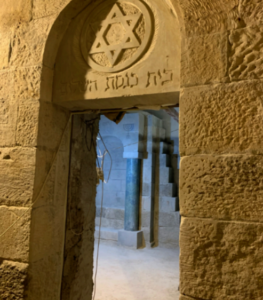
Entrance to the synagogue in the Peace Project.
In fact, the planning, design and construction phases have proved to be challenging and enriching exercises in interfaith cooperation and understanding.
“The entire project has become a deep learning experience for all parties and individuals involved,” the summary explains. “Project managers had to work closely with Sephardic and Ashkenazi rabbis to ensure that the Peace Synagogue would be acceptable and a comfortable place of worship for Jews from all three branches of Judaism: Orthodox, Reformed and Conservative traditions. Similarly, consultations had to be carried out with Sunni, Shi’a and Sufi clergy, so that the Peace Mosque would be a satisfactory space for worship and prayer for all Muslims.”
But the project has its detractors, including voices in the Orthodox Church, Georgia’s largest faith group, and in some Protestant circles. Such pushback is nothing new to the congregation, Songulashvili said.
“We received a lot of criticism when we consecrated the first female bishop in the country 13 years ago, including harsh criticism from the Orthodox Church. Now she is widely accepted in Georgia and her voice is being regularly heard in the public domain on religious issues, ethics, social justice and war and peace,” he said. “So, we are not scared of criticism because even the people who start criticizing our projects eventually realize it’s not as dangerous as they thought originally.”
But the project has its ardent backers, too, and none of them more supportive than the Alliance of Baptists.
“Our friendship with the Alliance is the most durable and reliable relationship we have ever had with any religious organization because it is deeply personal, it is based on friendship, mutual respect and a commitment to learn from each other’s experiences,” Songulashvili said.
The relationship began in the late 1980s when Roger Crook and the late Mary Ruth Crook, members of Pullen Memorial Baptist Church in Raleigh, N.C., traveled to Georgia for the first time and Songulashvili preached at the Alliance member church in North Carolina a decade later.
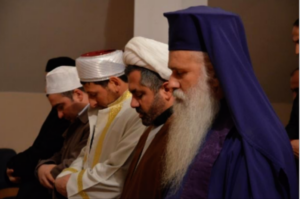
Peace Project faith leaders together.
The partnership between the Peace Cathedral and the Alliance is even built into the Peace Project, where the interfaith center and one of the libraries will be named after the Crooks, said Paula Clayton Dempsey, director of partnership relations for the Alliance until her retirement in 2021.
Songulashvili worked with the Alliance and many of its churches the same way he works with other faith groups, said Dempsey, who has traveled to Tbilisi on multiple occasions. “You can see Malkhaz has spent years developing interfaith relationships. My own life has been enriched by the interfaith relationships I have developed in that context.”
The Peace Cathedral also is unique because its worship, like its liturgical calendar and Songulashvili’s title, is reflective of the Orthodox Christian culture in which it is situated. “It looks and sounds and smells Orthodox, but it’s Baptist,” she said.
But that is where the similarities end because the nation’s Evangelical Baptist Church, which Songulashvili also serves as bishop, is shunned by the Georgian Orthodox. “Baptists are such a minority in Georgia that they find more community with the Yazidi, Muslims and Armenian Orthodox. If you’re not Georgian Orthodox, you’re not Georgian,” Dempsey said.
Peace Temple’s welcoming posture toward gay, lesbian and transgender people has been especially healing given their harsh treatment by other religious authorities, she added. “The Georgian Orthodox Church is so hard on the LGBTQ community. There is no place for anyone in that community.”
Songulashvili said connection with the Alliance has encouraged his congregation to take those stands. “This relationship has been a blessing for our church in Georgia and an encouragement in our struggle with religious bigotry.”
And growing up in a family that welcomed Chechen refugees during Chechnya’s 1990s war with Russia introduced the concept of interfaith ministry, he added. “I was born into a very conservative Baptist family but when we started welcoming refugees, we made it clear we would not use our means of support and relief work in order to convert them to Christianity. We wanted to show unconditional love. And now this philosophy has helped us (the Peace Cathedral) to build genuine human relationships with Muslims, Jews, Yazidi and others have suffered immensely.”
Related articles:

